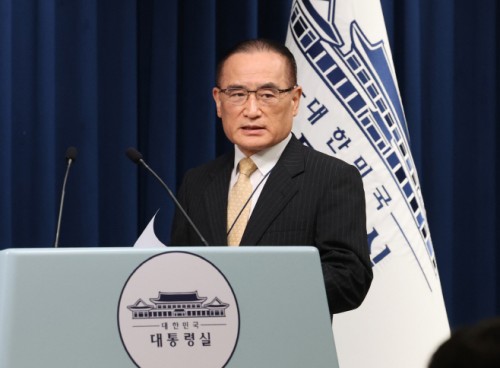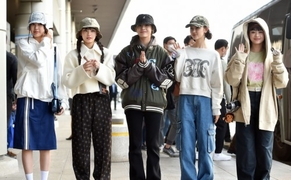 |
| Wi Sung-lac, South Korea's national security adviser, enters the press briefing room at the presidential office in Yongsan, Seoul, on July 9, to report on his recent trip to the United States. / Source: Yonhap News |
National Security Adviser Wi Sung-lac said on July 9 that the U.S. expressed agreement on holding a South Korea–U.S. summit at an early date, though no specific schedule has been confirmed.
Speaking at a briefing after returning from a four-day visit to the United States, Wi said, "I proposed holding a summit as soon as possible to facilitate mutually beneficial agreements on various pending issues, and Secretary of State Marco Rubio expressed agreement." However, Wi clarified, "Although the two sides did narrow the window for potential timing, there is no definitive date, and we cannot say it will be before or after August 1."
Wi noted that while the Special Measures Agreement (SMA) on defense cost-sharing was not formally discussed during his visit, broader discussions on defense spending did take place. He did not disclose further details.
At the presidential office in Yongsan, Wi explained that he had an in-depth meeting with Secretary Rubio during the Korea-U.S. National Security Advisers’ Dialogue. "We emphasized that despite differences on some issues, both sides should work toward resolution under the broader framework of alliance development and trust-building."
He added that President Trump’s recent letter, believed to focus on tariffs and non-tariff barriers, contrasts with Korea’s wider-ranging concerns across trade, investment, procurement, and security. "We proposed taking a comprehensive approach, and Secretary Rubio’s team responded positively," Wi said.
Wi also shared that Rubio’s aide clarified the letter—sent ahead of the July 9 deadline—had been distributed uniformly to countries without trade agreements and that there was still room for negotiations until August 1. "We agreed to maintain close communication during this window."
Although both sides reached consensus on the need for an early summit, they did not finalize a date. When asked if more progress had been made on setting a timeline, Wi answered, "We’re not at the stage of pinpointing a date yet."
He stressed that while a summit could consolidate various negotiations—including tariffs and defense issues—it is not the sole determinant. "We consider it ideal to conclude talks through multiple channels and eventually present them at a summit, but we also remain open to alternative approaches depending on developments," he said.
Wi noted that Korea currently contributes over 1.5 trillion won under the SMA and that overall defense spending may increase in line with global trends. "Our contribution is already substantial and may rise further," he said.
When asked whether U.S. troop levels in Korea or wartime operational control could be used as bargaining chips in tariff negotiations, Wi replied, "Such matters, including defense spending, fall under the scope of security consultations. These are long-term issues but very much part of the current agenda."
He concluded, "As discussions proceed, some topics may eventually be brought to the summit level."
Most Read
-
1
-
2
-
3
-
4
-
5
-
6
-
7





















